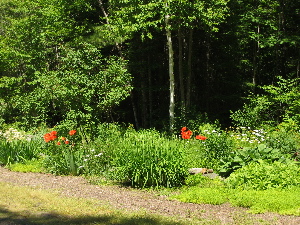RAIN GARDEN DEFINITION
A rain garden is NOT a pond! They are not designed to hold water permanently. An effective rain garden depends on water infiltrating into the soil of the garden. They are actually miniature temporary wetlands planted with native plants.
A rain garden is an attractive, low maintenance landscaping feature planted with perennial native plants naturally adapted to wet conditions. It allows plants, bacteria, and soils to clean the water as it seeps its way into the ground. This usually takes only a few hours. It is a way for homeowners as well as businesses to participate in the reduction of polluted runoff. It is an infiltration technique in the form of a planted depression, designed to soak up storm-water run-off from impervious surfaces such as roofs, driveways, patios, walkways, basement sump pumps, and even compacted lawn areas. Storm water runoff is considered one of the main sources of water pollution nationwide. There is a movement that just might get storm water management out of the curb and gutter and into our front and backyards. the water is held in the landscape so it can be taken in aby plants and soak into the ground instead of flowing into a street and down a storm drain or drainage ditch.
This reduces rain runoff by allowing storm water to slowly filter into a garden that features native plantings (as opposed to flowing into storm drains and surface waters which causes erosion, water pollution, flooding and diminished groundwater). Rain Gardens can cut down on the amount of pollution reaching creeks and streams by up to 30%. They prevent storm water from becoming contaminated with oils and other chemicals in the first place. The soil, mulch and plants actually remove and break down pollutants from the water as it percolates through the soil on it's way to become groundwater.
These gardens can be small, formal, home-owner style gardens, large complex bio-retention gardens, or anywhere in between. It might seem that this is a very small contribution, but collectively, rain gardens can produce water quality benefits. These gardens are a sustainable way to recharge our water in a way the current system is NOT. Planting a small rain garden somewhere near you home helps lock rain water in the ground, reducing the flow of pollutants and poisons into the drains.






1 Comments:
I just built one of these fairly recently. I haven't put the plants in yet but did all the ground work. I waiting for warmer weather to finish the planting. I made a catch all area underneath the soil with gravel. This has helped my driveway drainage problem enormously. It's a good idea for anyone with drainage issues!
Post a Comment
<< Home